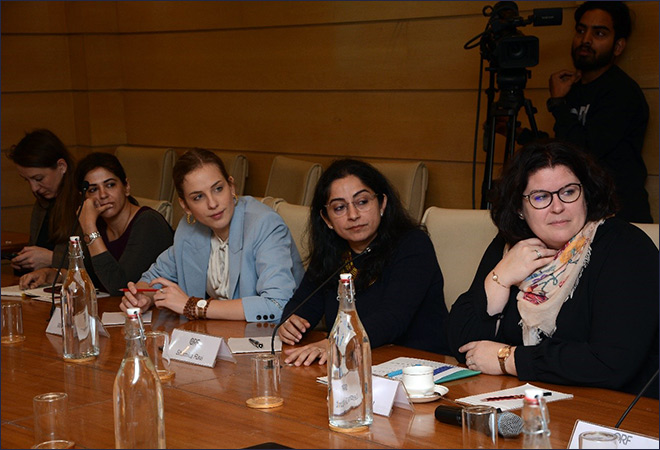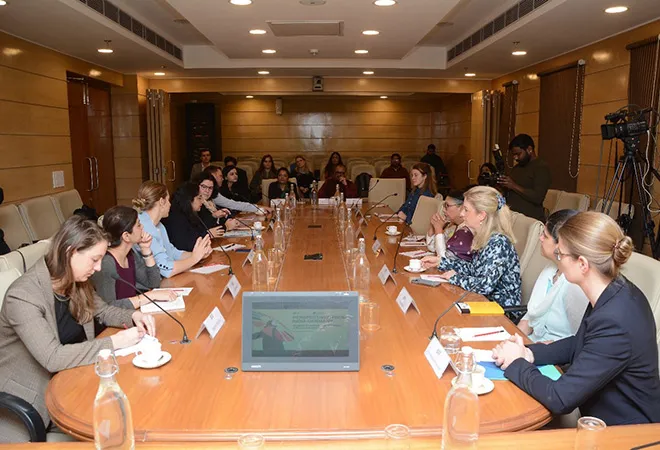Several developments in recent years have necessitated a serious dialogue to catalyse women’s leadership, mainstream women entrepreneurship, and drive investment in women-led enterprises and institutions around the world. Building consensus around women’s led development remains critical to drive key economic opportunities, skill building, progressive legislation, and fostering partnerships in achieving long-term inclusive benefits within the 2030 Development Agenda.
Silhouetted with this ‘women’s led development” stimulus, the Observer Research Foundation, in collaboration with Konrad Adenauer Stiftung, organised a closed-door roundtable discussion on ‘Perspectives from India-Germany: Women’s Leadership on SDGs and Green Growth’, on 6 December 2022. Attended by a high-level German women leaders’ delegation, along with women development experts from India, the discussants exchanged diverse viewpoints on the conversations around women’s leadership competencies and areas that needed attention to uphold and accelerate global goals. The key takeaways from the discussion are highlighted below.
- Firmly convinced of shared Indo-German interests in multilateral responses to global challenges, participants called for greater action in the light of advancing women’s leadership within the framework of the 2030 SDGs and beyond.
- Experts from both sides culled out three clear verticals that set the tone of the conversations: Building consensus on coherent gender development issues; zeroing down on critical areas to boost women’s agency in green growth and sustainable development; and pathways to advance inclusive and resilient societies filtered through a ‘women’s led growth agenda’ at a momentous point in time when India holds the G20 Presidency.
- Acknowledging the existing gender gap in STEM, experts agreed the growing need to augment inspiring role models to nurture a future generation of women workforce, invoking interest not only in workplaces but also by subsuming motivating images in school curriculum, media, and popular culture.
- Agreeing upon a global policy agenda on changing the work balance for women in the care economy was another critical area that was explored by the speakers.
- Participants also touched upon the socio-political aspects and gender roles in forest landscape restoration/bio-diversity in order to ensure equitable sharing of benefits.
- Facilitating a just energy transition and fostering gender smart climate finance were critical concerns among the speakers who called upon the greater need for decentralised renewable energy and clean technologies to generate income opportunities for women.
- A bottom-up approach that has strengthened women’s political participation in India can also be an area of shared best practices between countries.

The talks highlighted the immediate need to examine the interlinkages between gender equality through the lens of the 2030 SDGs and provide pragmatic solutions for enhancing women’s leadership in climate change and green recovery, securing top positions in STEM, corporate boardrooms and political sphere, recognising women’s work dynamics in the care economy, transforming intergenerational gender biased mindsets, and bolstering interventions that promote women role models for future generations.
The views expressed above belong to the author(s). ORF research and analyses now available on Telegram! Click here to access our curated content — blogs, longforms and interviews.

 The talks highlighted the immediate need to examine the interlinkages between gender equality through the lens of the 2030 SDGs and provide pragmatic solutions for enhancing women’s leadership in climate change and green recovery, securing top positions in STEM, corporate boardrooms and political sphere, recognising women’s work dynamics in the care economy, transforming intergenerational gender biased mindsets, and bolstering interventions that promote women role models for future generations.
The talks highlighted the immediate need to examine the interlinkages between gender equality through the lens of the 2030 SDGs and provide pragmatic solutions for enhancing women’s leadership in climate change and green recovery, securing top positions in STEM, corporate boardrooms and political sphere, recognising women’s work dynamics in the care economy, transforming intergenerational gender biased mindsets, and bolstering interventions that promote women role models for future generations.